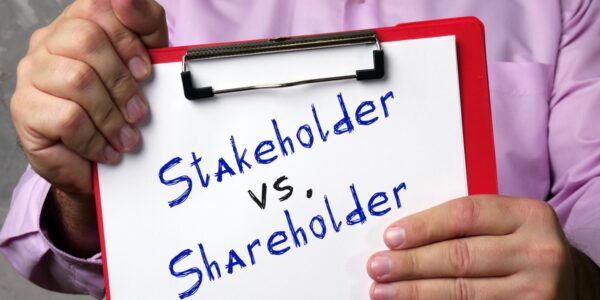As a business owner, you’ll come across many corporate buzzwords. Two such words are ‘shareholder’ and ‘stakeholder’. You might already know what these mean, or you may have an idea, but for some entrepreneurs, they’ll be entirely new concepts.
In this post, we explain the differences and similarities between stakeholders and shareholders, and the roles they play within a company.
What is a shareholder?
A shareholder, also known as a member, is someone who owns one or more shares in a company. Those shares represent the shareholders’ portion of the business and provide them with certain rights and responsibilities.
These rights and responsibilities are detailed in the company’s articles of association and any shareholder agreements that might be in place. Although they can vary from company to company, the general rule is that the greater the proportion of shares someone holds in a company, the greater their ownership.
The role of a shareholder
Shareholders don’t typically get involved in the day-to-day running of a business. Their exact role will be dictated by the rights attached to their shares. Their rights will typically include things such as:
- Attending general meetings
- Voting on certain matters, such as the appointment of new directors
- Inspecting director service contracts
- Changing the company’s articles of association
In addition to enjoying the rights of the shares, shareholders also take on some responsibility. Specifically, they take on the liability for any unpaid amounts on the shares they hold (this is normally just the nominal value of the shares, which in most companies is £1.00). If the company ever faced financial difficulties or the directors demanded otherwise, the shareholder would be required to pay up the unpaid amounts on the share(s) they hold.
For example, if a shareholder held 2 shares in a company with a nominal value of £1.00 each (of which all the nominal value was unpaid), they would be required to pay the company up to £2.00 if the company ever required them to do so.
In a small company, it’s common for the shareholder(s) to also be a director(s). Unlike shareholders, directors do get involved with the day-to-day running of a business, taking on a wide range of duties, as well as legal obligations, including:
- Maintaining health and safety policies
- Managing payroll
- Promoting the company’s success
- Following the company rules, as set out in the articles of association
- Keeping, maintaining, and reporting changes to the company’s statutory records
- Filing annual accounts and confirmation statements
- Paying Corporation Tax to HMRC
What is a stakeholder?
A stakeholder is a person, organisation, or group that influences a company and is interested in its performance/operations. They do not have to be directly connected to the company to be a stakeholder; they can be either “internal” or “external” stakeholders.
Internal stakeholders are those from within the company. They usually consist of the company’s employees, the board of directors and – here’s the overlap – shareholders. These groups have a direct ‘stake’ in the business and effect and are affected by its actions.
Meanwhile, external stakeholders are those from outside the company. They can include customers, government bodies, agencies, and even the general public. While they are not part of the inner business structure, they still have certain powers over its activities.
The role of a stakeholder
We’ve established that stakeholder groups can vary widely. Therefore, the specific role of each group will depend on who they are and their relation to the company. Let’s take a look at some common stakeholder examples.
Shareholders
While not all stakeholders are shareholders, all shareholders are stakeholders. They are the owners, they provide the company with financial backing, and they make decisions concerning certain aspects of the company (such as its articles of association). They are also beneficiaries of the company’s success.
Employees
The company impacts employees in many ways, such as their salaries, working conditions and continued employment. Employees also have the power to shape the workplace culture.
Customers
Customers are essential external stakeholders. They have an interest in the company’s products and services and, for the company, are a key revenue source.
Government bodies
Various government bodies impose specific rules and regulations on different types of companies, thus affecting how they operate. For example, all UK companies must file annual accounts with Companies House and must pay certain business taxes to HMRC.
Suppliers, agencies, contractors, and freelancers
Many businesses outsource some of their processes, such as marketing, accounting, or design. Whether it’s an agency, contractor, or freelancer, these individuals have a direct relationship with the company and rely on it financially. In turn, the company relies on the clients’ services to generate value and help the business progress.
General public
Finally, there’s the general public. Not only do they rely on a company’s products and services (as customers), but they may also be indirectly impacted by them (even if they don’t use the products and services themselves).
The general public can also influence the company, driving trends and demands. Certain communities, such as environmental unions or social movement groups can also impact a company’s operations.
Why understanding your stakeholders is crucial
All companies should be aware of their different stakeholders, as those stakeholders’ demands or interests may impact the company’s success and operations.
If a company neglects the needs of certain stakeholders, it may be negatively affected. For example, suppose they neglect the needs of their own suppliers. In that case, those suppliers may look to end their relationship with the company, potentially preventing the company from carrying on business.
Furthermore, company directors have a legal obligation to consider the company’s different stakeholders when making decisions. This is specifically detailed in section 172 of the Companies Act 2006, which demands directors promote the company’s success. Part of that success includes having regard for the company’s stakeholders when making decisions – including its employees, the local community, and the environment.
Key differences
Both groups share some similarities; however, a significant difference between stakeholders is their actual ownership of a company.
Whereas shareholders own a company, other stakeholders usually do not (unless they also happen to be shareholders). That’s not to say other stakeholders don’t have any control. While they don’t hold any company shares, they do have the power to influence a business’ processes and be affected by them.
Another important distinction is priorities. Shareholders sometimes prioritise profit, while other stakeholders may be more inclined to concern themselves with the company’s long-term performance. They might aim to maintain strong supplier relationships, create a positive workplace environment for staff, or improve customer satisfaction. Some of these initiatives may ultimately be financially advantageous, but the main priority lies in the broader benefit to the company.
Ultimately, different stakeholders in different companies will have other priorities. What connects them is that they have an interest in, or are affected by, the company and its operations.
Thanks for reading
It’s easy to confuse the terms ‘shareholder’ and ‘stakeholder’. They are often used interchangeably, but that’s not strictly correct. The key takeaway is that shareholders own the company, and stakeholders have an interest in its activities.
We hope you found this blog helpful. If you have any questions, please post them below.
Please note that the information provided in this article is for general informational purposes only and does not constitute legal, tax, or professional advice. While our aim is that the content is accurate and up to date, it should not be relied upon as a substitute for tailored advice from qualified professionals. We strongly recommend that you seek independent legal and tax advice specific to your circumstances before acting on any information contained in this article. We accept no responsibility or liability for any loss or damage that may result from your reliance on the information provided in this article. Use of the information contained in this article is entirely at your own risk.












Join The Discussion
Comments (2)
Thanks for the article! It was helpful learning about the differences between stakeholder vs shareholder for my own UK accountants business, Nacstaccs.
Thank you so much for taking the time to leave a comment!
We truly appreciate your input and are glad to hear your thoughts. It helps us improve and continue sharing valuable content.
Kind regards,
The QCF Team